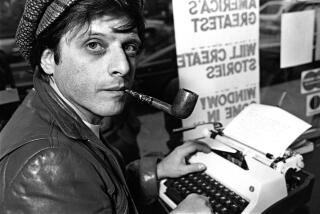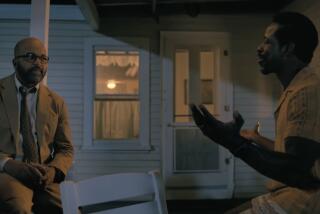A Provocative Literary Sensation
- Share via
Unlike the nameless hero of his landmark novel, Ralph Ellison was no “Invisible Man.” When his searing, surreal tale of a young black man’s quest for identity in racist America was published in 1952, Ellison became a literary sensation. But like the hero’s grandfather, whose raspy deathbed rant lingers throughout the novel, Ellison was a constant puzzle.
The author’s devotees and detractors get their due in a frank and lively “American Masters” presentation, “Ralph Ellison: An American Journey” (9 p.m. on KCET, KVCR).
Ellison portrayed the black experience with a complexity unseen in earlier works of so-called protest fiction. He stretched the bounds of the novel and helped shape racial discourse. Says Harvard professor Cornel West: “It is impossible to be a serious student of American culture and Afro-American culture without going through Ellison. He is the brook of fire through which one must pass.”
Yet Ellison’s flame burned too coolly for some. His quiet rage dismayed those who wanted a call to revolution, not a call for introspection. Says author and activist Amiri Baraka: “Ellison is a very skillful craftsman. But the most dangerous thing in the world is a very skilled craftsman with very backward ideas.”
Ellison felt unjustly stung by “Uncle Tom” accusations. He struggled for decades on a second novel, a sweeping look at the American experience through the lens of race. It proved to be his elusive whale, although an excerpt was published as the novel “Juneteenth” in 1999, five years after his death.
Through it all, Ellison wrote provocative essays and never faded from the literary scene. As one scholar puts it, “His reputation seemed to grow with every novel he didn’t write.”
More to Read
Sign up for our Book Club newsletter
Get the latest news, events and more from the Los Angeles Times Book Club, and help us get L.A. reading and talking.
You may occasionally receive promotional content from the Los Angeles Times.










